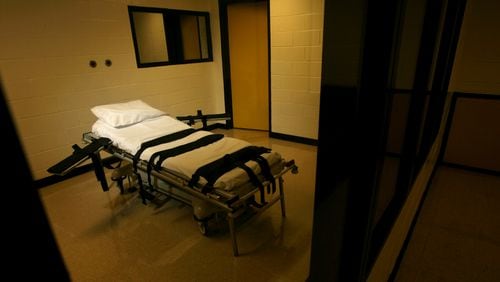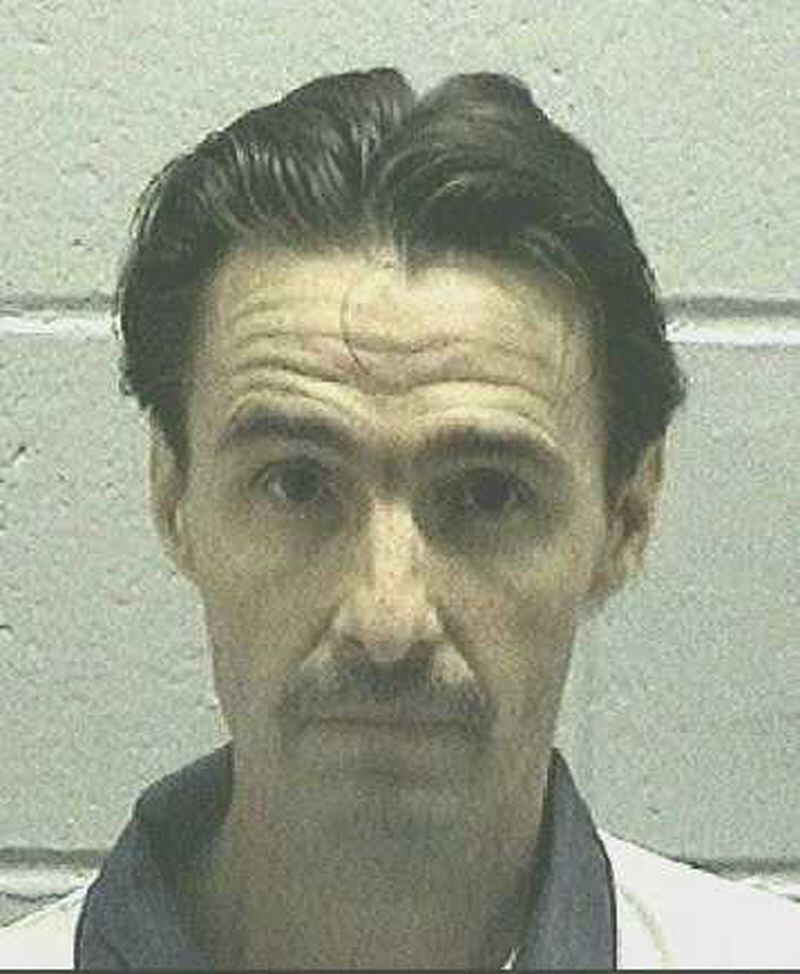Condemned murder J.W. "Boy" Ledford Jr. has asked a federal court to declare lethal injection unconstitutional because Georgia law does not allow him to choose death by firing squad.
In a federal complaint, Ledford’s lawyers wrote that he has been taking medication for “severe and chronic nerve pain” for years and the drug, gabapentin, had changed his brain chemistry.
“There is a substantial risk that Mr. Ledford will be aware and in agony as the (lethal injection drug) pentobarbital attacks his respiratory system, depriving his brain, heart and lungs of oxygen as he drowns in his own saliva,” according to the complaint.
Ledford is set to be executed next week for murdering his neighbor, a 73-year-old doctor, in northwest Georgia 25 years ago. If he dies by lethal injection as planned, Ledford will be the first person Georgia has put to death this year.
But his lawyers want lethal injection declared unconstitutional because Georgia law does not allow condemned murderers to chose the method of their executions. They write that there could be a "horrific" reaction to the pentobarbital, and that would violate Ledford's constitutional protection from cruel and unusual punishment, the federal complaint says.
His lawyers raise the issue of death by firing squad just a few days after the 11th U.S. Circuit Court of Appeals denied an Alabama Death Row inmate's request the he be allowed to choose hanging or firing squad.
“Mr. Ledford proposes that the firing squad is a readily-implemented and more reliable alternative method of execution that would eliminate the risks posed to him by lethal injection,” the complaint says. “The binding precedent of the 11th Circuit, however, restricts Mr. Ledford to proposing only those alternatives already authorized by Georgia statute.”
"As the Georgia code allows no method of execution but lethal injection, and given the broad unavailability of alternative drugs, Mr. Ledford is effectively foreclosed from meeting his burden in this action," it continiues. "Mr. Ledford's dilemma illustrates why this standard is unworkable."
The filing late Thursday is Ledford’s first attempt, using the courts, to stop his scheduled execution since the U.S. Supreme Court refused to step in early last month.
The complaint was filed in federal court in Atlanta as the State Board of Pardons and Paroles was releasing Ledford’s clemency petition. In it, his lawyers wrote that he is deeply sorry for murdering Dr. Harry Johnston in Murray County.
The clemency petition also says five of the jurors who voted for the death penalty would now like to see him serve life without parole instead.
“The inflexibility of the legal system sometimes leaves an otherwise deserving individual without a remedy,” his lawyers wrote. “Inevitably there will be instances in which the fixed rules governing the legal process yield a result that does not accommodate fairness. Clemency exists for just this situation.”
But District Attorney Bert Poston, who prosecutes in the circuit that includes Murray County where the crime was committed, said if ever a murder called for the death penalty, the 1992 murder of Dr. Harry Johnston did.
“I’ve seen the pictures,” said Poston, who became a prosecutor in the circuit only two months before Johnston’s murder. “I’ve been doing this for 25 years and I’ve handled a lot of murder cases and I can’t think of many that come close.”
The State Board of Pardons and Paroles will hear from Ledford's advocates Monday morning and then in the afternoon from Poston and others who want to see the sentenced carried out.
Ledford, 45, is scheduled to be executed Tuesday at the Georgia Diagnostic and Classification Prison near Jackson, one of two men who are set to die by lethal injection in the country on that day; Texas also has an execution scheduled. Last year, Georgia executed nine men, more than any other state.
Johnston’s widow died in February, Poston said.
“She wanted very much to live long enough to see justice served,” Poston said. “All the delays have robbed her of that.”
According to court records, one of the cuts that Ledford delivered to Johnson’s neck almost decapitated the 73-year-old man, who had been the doctor who delivered Ledford, whom his lawyers repeatedly referred to using his nickname, “Boy Ledford.”
Ledford admitted to the murder but claimed it was in self-defense. He said the doctor had struck him during an argument over whether the younger man had stolen from his neighbor.
“Boy Ledford confessed to killing Dr. Johnston the day after he was arrested and has never denied killing him,” the clemency petition said. “The pain of killing the doctor is something that he lives with daily.”
Ledford’s lawyers say he was drunk and using drugs on the day of the crime. According to testimony and court records, Ledford had consumed a six-pack of 16-ounce beers, smoked about 10 marijuana cigarettes and had taken some pills. Ledford told one doctor who examined him that he “was generally ‘messed up.’”
His lawyers wrote in the clemency petition that Ledford, whom identified by his nickname “Boy,” started drinking when he was 8 and moved on to drugs by age 10. His father was a “mean drunk” and a strict disciplinarian who abused Ledford and his six sisters, usually when he was using drugs or drinking, the clemency petition said.
“The background is not an excuse for what Boy Ledford has done,” the lawyers wrote. “It is offered to allow the board some insight into how a young man barely 20 years old with no history of violence ended up killing a man who was his neighbor.”
About the Author







